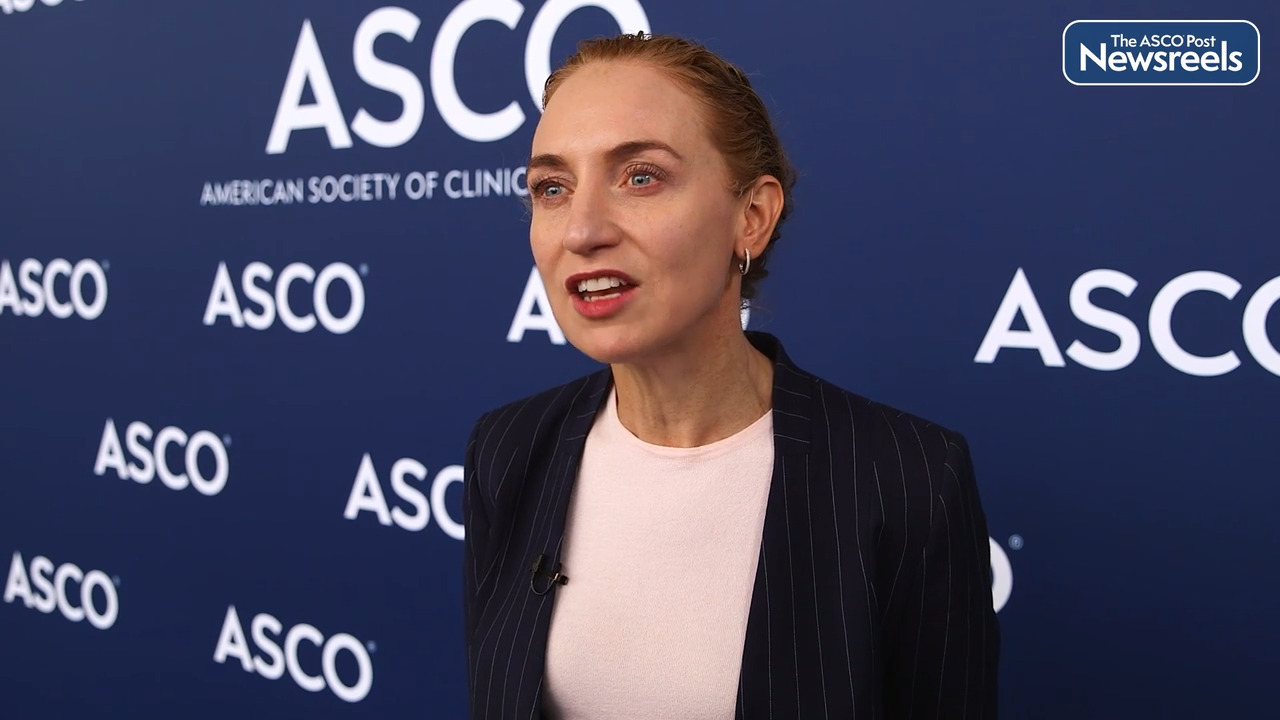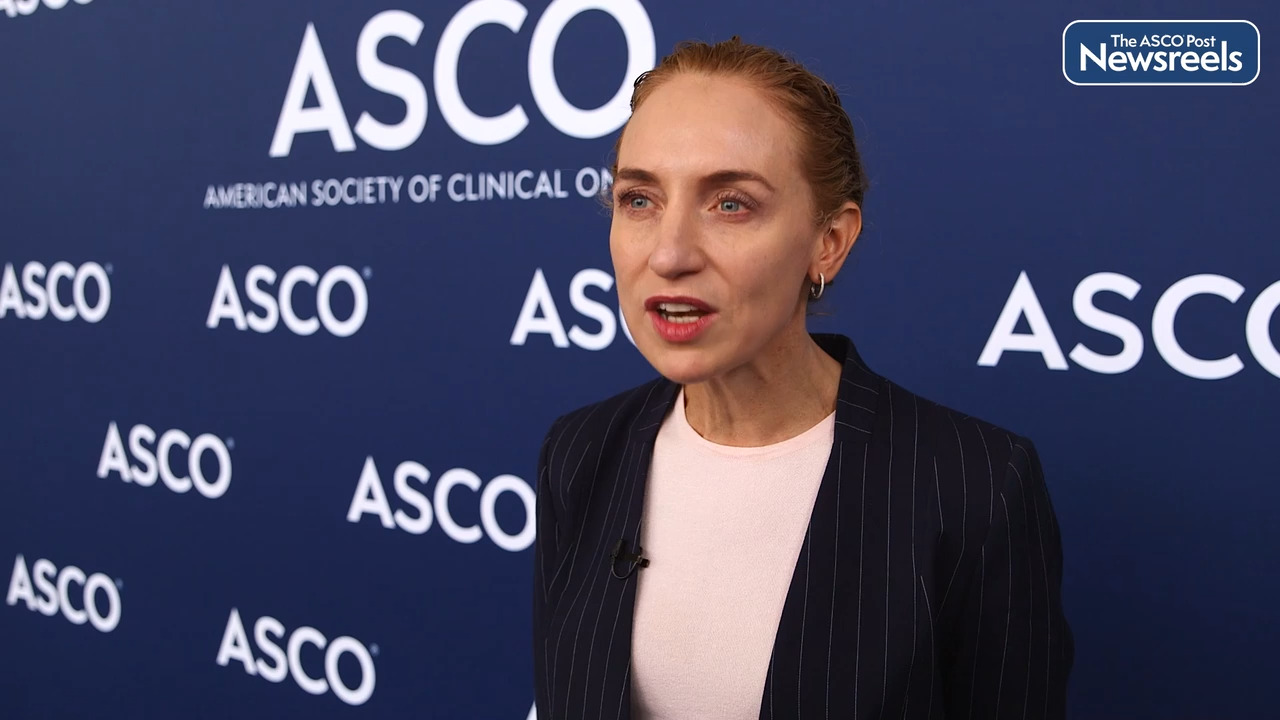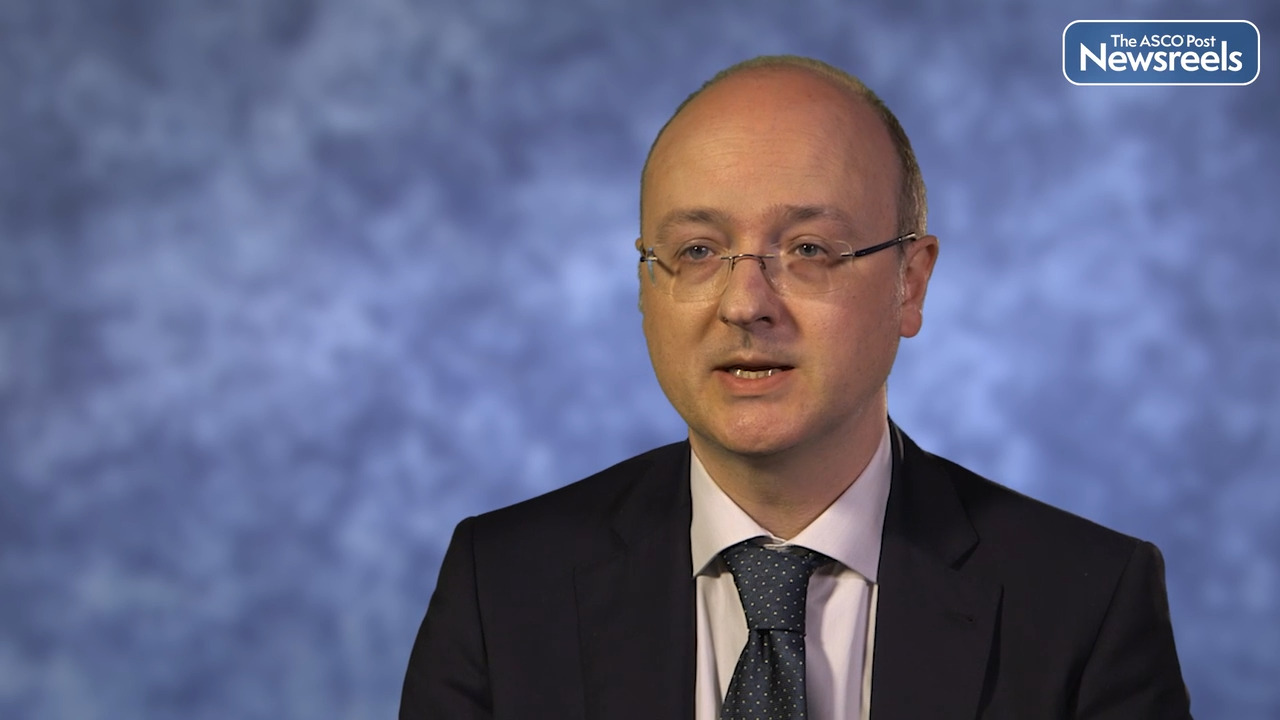Judging Melanoma Thickness: Comparison of Dermatologists and Machine-Learning Algorithm
Assessing the thickness of melanoma is difficult—whether done by an experienced dermatologist or a well-trained machine-learning algorithm. A study published by Polesie et al in the Journal of the European Academy of Dermatology and Venereology showed that an algorithm and a group of approximately...
New Gene-Profiling Technology Reveals Potential Melanoma Biomarkers
Diagnosing melanoma clinically and under the microscope can be complicated by the presence of melanocytic nevi, otherwise known as birthmarks or moles that are noncancerous. The development of melanoma is a multistep process, where melanocytes mutate and proliferate. Properly identifying melanoma...
ASCO Guideline Update for Systemic Melanoma Therapy Addresses New Treatment Option for Uveal Melanoma
A rapid update to the ASCO guideline on systemic therapy for melanoma adds a new recommendation for the treatment of patients with metastatic uveal melanoma.1 The update follows the January 2022 U.S. Food and Drug Administration (FDA) approval of tebentafusp-tebn for patients with previously...
An Oncology Surgeon Leads Mexico’s Melanoma Program
In this installment of The ASCO Post’s Global Oncology series, Guest Editor Chandrakanth Are, MBBS, MBA, FRCS, FACS, spoke with surgical oncologist Héctor Martínez-Said, MD, of the Melanoma Clinic at NCI Mexico. Dr. Martínez-Said’s maternal grandfather was part of a Lebanese immigration movement...
Androgen Receptor Signaling May Contribute to Targeted Therapy Resistance in Patients With Melanoma
Androgen receptor (AR) signaling may affect response to BRAF/MEK inhibitor therapy in both male and female patients with melanoma, according to findings from a study published by Vellano et al in Nature. The report provides a new target to combat therapeutic resistance and one possible answer to...
Georgina V. Long, MD, PhD, on Melanoma: Distant Metastasis–Free Survival With Adjuvant Pembrolizumab
Georgina V. Long, MD, PhD, of the Melanoma Institute Australia, The University of Sydney, discusses phase III findings from the KEYNOTE-716 study. The trial showed that compared with placebo, adjuvant pembrolizumab significantly improved distant metastasis–free survival in patients with resected stage IIB and IIC melanoma. The findings also suggest a continued reduction in the risk of recurrence and a favorable benefit-risk profile (Abstract LBA9500).
Georgina V. Long, MD, PhD, on Melanoma: New Data on Pembrolizumab, Dabrafenib, and Trametinib
Georgina V. Long, MD, PhD, of the Melanoma Institute Australia, The University of Sydney, discusses findings from the NeoTrio trial on neoadjuvant pembrolizumab alone, in sequence with, or concurrent with dabrafenib plus trametinib in patients with resectable BRAF-mutant stage III melanoma. The study may help clinicians determine the optimal combination of therapy (Abstract 9503).
Mario Sznol, MD, and Stefania Scala, MD, on Improving Responses to Immunotherapy in Patients With Melanoma
Invited study discussant of the use of ipilimumab plus nivolumab in resistant melanoma, at the AACR Annual Meeting 2022, Mario Sznol, MD, of Yale University Cancer Center, indicated that the substantial increase in progression-free survival at 6 months was not maintained. “The durable...
Approaches to Potentiate Immune Response in Patients Who Do Not Respond to Anti–PD-1 Therapy for Melanoma
A sizable proportion of patients with advanced melanoma will experience disease progression on anti–PD-1 therapy, and the optimal treatment of such patients represents an unmet need. Two studies presented at the American Association for Cancer Research (AACR) Annual Meeting 2022 explored separate...
Anti–CTLA-4 Antibody–Based Treatment in Patients With Metastatic Melanoma Experiencing Disease Progression on Relatlimab/Nivolumab
In a study reported as a letter to the editor in The New England Journal of Medicine, Alexander M. Menzies, MD, and colleagues found that patients with metastatic melanoma who had progressive disease while receiving relatlimab/nivolumab had poor responses to anti–CTLA-4–based treatment. As noted...
Fixed-Dose Nivolumab and Relatlimab-rmbw for Unresectable or Metastatic Melanoma
In the Clinic provides overviews of novel oncology agents, addressing indications, mechanisms of action, administration recommendations, safety profiles, and other essential information needed for the appropriate clinical use of these drugs. On March 18, 2022, fixed-dose nivolumab and...
RELATIVITY-047 Update: Novel Immunotherapy Duo Delays Disease Progression in Advanced Melanoma
A novel immunotherapeutic combination that targets PD-1 and the LAG-3 pathway significantly delayed disease progression as a first-line treatment of advanced or unresectable melanoma. Updated results of the global phase III RELATIVITY-047 trial validated the study’s initial findings and were...
Genevieve Boland, MD, PhD, on Advanced Melanoma: Best Management Practices
Genevieve Boland, MD, PhD, of Massachusetts General Hospital Cancer Center, discusses targeted treatments and immunotherapies and how they have dramatically changed the landscape in melanoma. Initially used in advanced disease, these agents are now being used in local or locoregional melanoma in the adjuvant and/or neoadjuvant settings. Dr. Boland also talks about the critical importance of multidisciplinary teams to integrate the latest recommendations for patient care.
Turnaround Times in Melanoma BRAF Testing and Effect on Time to Treatment Initiation
In a single-center study reported in JCO Oncology Practice, Ceballos et al identified turnaround times for request and receipt of melanoma BRAF testing results. They also analyzed factors in differences in turnaround times and effects on time to initiation of treatment. The study included 66...
Ipilimumab Plus Nivolumab Improves Progression-Free Survival in Advanced Melanoma
Patients with advanced melanoma whose cancer does not respond to treatment with PD-1 inhibitors are often switched to treatment with a second type of immunotherapy drug, a CTLA-4 inhibitor such as the drug ipilimumab. In a phase II trial presented by Vanderwalde et al during the American...
Adjuvant Pembrolizumab in Resected Stage IIB or IIC Melanoma
As reported in The Lancet by Luke et al, the phase III KEYNOTE-716 trial has shown significantly prolonged recurrence-free survival with adjuvant pembrolizumab vs placebo in patients with high-risk completely resected stage IIB/IIC melanoma at both first and second interim analyses. The first...
Iván Márquez-Rodas, MD, PhD, on Advanced Melanoma: Efficacy of Intratumoral BO-112 With Systemic Pembrolizumab
Iván Márquez-Rodas, MD, PhD, of Spain’s Hospital General Universitario Gregorio Marañón, discusses final results of the phase II SPOTLIGHT203 study of systemic pembrolizumab in combination with intratumoral BO-112 for patients with advanced melanoma refractory to anti–PD-1–based therapy. The regimen achieved an overall response rate of 25% and a disease control rate of 65% (Abstract CT014).
Ari M. VanderWalde, MD, MPH, MBioeth, on Melanoma: New Data on Ipilimumab and Nivolumab
Ari M. VanderWalde, MD, MPH, MBioeth, of The West Clinic, discusses results from the S1616 trial involving patients with metastatic or unresectable melanoma who had primary resistance to PD-1 or PD-L1 inhibitors. Compared with ipilimumab alone, the combination of ipilimumab plus nivolumab benefited some patients: those with tumors that responded to therapy showed an increased amount of CD8+ cells. Because there is no standard treatment for metastatic melanoma after failure of PD-1 inhibitors in BRAF wild-type disease, this research may provide a viable option in the future (Abstract CT013).
RELATIVITY-047: Relatlimab Plus Nivolumab Worthy of Further Study in Advanced Melanoma and Beyond
In the recently published results of the RELATIVITY-047 trial,1 summarized in this issue of The ASCO Post, the addition of relatlimab to nivolumab monotherapy was associated with improved progression-free survival compared with nivolumab alone in patients with previously untreated advanced,...
Addition of Anti–LAG-3 Antibody Relatlimab to Nivolumab Improves Progression-Free Survival in Previously Untreated Advanced Melanoma
In a phase II/III trial (RELATIVITY-047) reported in The New England Journal of Medicine, Hussein A. Tawbi, MD, PhD, of The University of Texas MD Anderson Cancer Center, and colleagues found that the addition of relatlimab, a lymphocyte-activation gene 3 (LAG-3)–blocking antibody, to nivolumab...
Immune-Related Adverse Events With Immune Checkpoint Inhibitor Treatment for Melanoma in Older White Patients
In a population-based cohort study reported in JAMA Network Open, Schonfeld et al identified the incidence of immune-related adverse events among White patients aged ≥ 65 years with newly diagnosed melanoma treated with immune checkpoint inhibitors. They compared the risk of these adverse events...
Thickness-Specific Incidence of Cutaneous Melanoma in the United States
In a population-based cohort study reported in JAMA Oncology, Chen et al found that the incidence of overall cutaneous melanoma and thinner tumors was stable in the United States from 2010 to 2018, with an increased incidence of the thickest (T4) melanomas being observed. Lower socioeconomic status ...
FDA Approves Nivolumab/Relatlimab-rmbw for Unresectable or Metastatic Melanoma
On March 18, the U.S. Food and Drug Administration (FDA) approved nivolumab and relatlimab-rmbw (Opdualag) for adult and pediatric patients 12 years of age or older with unresectable or metastatic melanoma. The approved treatment is a fixed-dose combination of the LAG-3–blocking antibody relatlimab ...
Immunotherapy Duo Delays Disease Progression in Previously Untreated Patients With Melanoma: RELATIVITY-047
A novel immunotherapeutic combination that targets PD-1 and the LAG-3 pathway may significantly delay disease progression as a first-line treatment of advanced or unresectable melanoma. Updated results of the global phase III RELATIVITY-047 trial validated the study’s initial findings and were...
Oncolytic Virus Plus Nivolumab Demonstrates Durable Response in Nonmelanoma Skin Cancer of the Head and Neck
Intratumor injection of the oncolytic virus RP1 in combination with the checkpoint inhibitor nivolumab has demonstrated durable antitumor activity in patients with nonmelanoma skin cancer of the head and neck, according to data presented at the 2022 Multidisciplinary Head and Neck Cancers...
Pathologic Response of Index Lymph Node and Concordance With Total Nodal Basin Pathologic Response in Stage III Melanoma
In a retrospective analysis reported in JAMA Surgery, Reijers et al found that pathologic response in largest lymph node metastasis (index lymph node [ILN]) was highly concordant with response in the total lymph node bed in patients with stage III melanoma receiving neoadjuvant...
Patients With Merkel Cell Carcinoma Face 40% 5-Year Recurrence Rate, According to Recent Study
Patients treated for Merkel cell carcinoma face a 5-year recurrence rate of 40%—markedly higher than the recurrence rates for melanoma and other skin cancers, according to research published by McEvoy et al in JAMA Dermatology. Additionally, in the study cohort of more than 600 patients, 95% of...
Predictive Models for Outcomes With Immune Checkpoint Inhibitor Treatment in Metastatic Melanoma
In a study reported in the Journal of Clinical Oncology, Pires da Silva et al developed predictive models for objective response and progression-free and overall survival among patients receiving anti–PD-1 antibodies with or without ipilimumab for metastatic melanoma. The analyses involved data...
Tebentafusp-tebn for Unresectable or Metastatic Uveal Melanoma
On January 25, 2022, tebentafusp-tebn, a bispecific gp100 peptide-HLA–directed CD3 T-cell engager, was approved for treatment of adults with HLA-A*02:01–positive, unresectable or metastatic uveal melanoma.1 Supporting Efficacy Data Approval was based on findings in the open-label, multicenter...
Researchers Identify Biomarkers That May Help to Predict Response to Immunotherapy for Melanoma
Melanoma is often curable when detected and treated in its early stages. However, the disease can rapidly spread to other organs in the body and become deadly. Immune checkpoint inhibitors have transformed the treatment of certain cancers, including melanoma, and improved patient care. But despite...
Potential Use of FDG-PET Findings in Reducing Duration of Immunotherapy in Patients With Advanced Melanoma
In a Danish retrospective study reported in the International Journal of Cancer, Ellebaek et al found that patients with advanced melanoma responding to PD-1 inhibitor therapy who stopped treatment within 18 months had improved survival outcomes when fluorodeoxyglucose (F-18) positron-emission...
Addition of Spartalizumab to Dabrafenib/Trametinib for BRAF V600–Mutant Advanced Melanoma
As reported in the Journal of Oncology by Reinhard Dummer, MD, and colleagues, the phase III COMBI-i trial has shown no significant progression-free survival benefit with the addition of the anti–PD-1 antibody spartalizumab to dabrafenib and trametinib in patients with no prior systemic treatment...
FDA Approves Tebentafusp-tebn for the Treatment of Unresectable or Metastatic Uveal Melanoma
On January 26, the U.S. Food and Drug Administration (FDA) granted approval to tebentafusp-tebn (Kimmtrak) for the treatment of adult patients with HLA-A*02:01–positive, unresectable or metastatic uveal melanoma. Tebentafusp’s approval establishes several firsts: as the first T-cell receptor...
Pembrolizumab for Adjuvant Treatment of Stage IIB or IIC Melanoma
On December 3, 2021, pembrolizumab was approved for adjuvant treatment of adult and pediatric (≥ 12 years of age) patients with stage IIB or IIC melanoma following complete resection.1 Supporting Efficacy Data Approval was based on findings in the phase III, double-blind KEYNOTE-716 trial...
Circadian Timing of Immune Checkpoint Inhibitors: Beyond Good Times and Bad Times
After almost a century of limited efficacy of cancer immunotherapy,1 the breakthrough happened in 2012 with the discovery of immune checkpoint inhibitors,2,3 leading to the 2018 Nobel Prize in Physiology or Medicine for James P. Allison and Tasuku Honjo. Yet about 40% of patients on immune...
Metastatic Melanoma: Improved Overall Survival Reported With Immunotherapy Infusions Given Earlier in the Day
In a single-institution study reported in The Lancet Oncology, David C. Qian, MD, PhD, and Zachary S. Buchwald, MD, PhD, of Winship Cancer Institute of Emory University, Atlanta, and colleagues found that patients with metastatic melanoma who received at least 20% of immune checkpoint inhibitor...
Addition of Anti–LAG-3 Antibody Relatlimab to Nivolumab in Previously Untreated Patients With Advanced Melanoma
In the phase II/III RELATIVITY-047 trial reported in The New England Journal of Medicine, Hussein A. Tawbi, MD, PhD, and colleagues found that the addition of relatlimab, a lymphocyte-activation gene 3 (LAG-3)-blocking antibody, to nivolumab, a PD-1 inhibitor, significantly prolonged...
Interim Radiographic Assessment for Adaptive Dosing of Combination Immunotherapy in Advanced Melanoma
In the phase II ADAPT-IT trial reported in the Journal of Clinical Oncology, Michael A. Postow, MD, and colleagues showed that findings on interim computed tomography (CT) allowed patients to avoid the third and fourth doses of combination nivolumab/ipilimumab for the treatment of advanced...
Is a High-Fiber Diet Associated With Improved Survival and Treatment Response in Patients With Melanoma?
Patients with melanoma who reported eating more fiber-rich foods when they began treatment with immunotherapy survived longer without cancer growth than patients with insufficient dietary fiber intake, according to new research published by Spencer et al in Science. The benefit was most noticeable...
Immune Checkpoint Inhibitor Treatment in Patients Aged 65 and Older With Advanced Melanoma: Association Between Sex and Survival
In a study reported in JAMA Network Open, Jang et al found that women with advanced melanoma receiving combination immune checkpoint inhibitor therapy with nivolumab/ipilimumab as their most recent immune checkpoint inhibitor therapy (all with prior ipilimumab treatment) had a poorer survival...
Long-Term Outcomes From CheckMate 067: Nivolumab/Ipilimumab, Nivolumab, or Ipilimumab in Advanced Melanoma
In a 6.5-year update of the phase III CheckMate 067 trial reported in the Journal of Clinical Oncology, Jedd D. Wolchok, MD, PhD, FASCO, and colleagues provided long-term overall survival as well as melanoma-specific survival findings among patients with advanced melanoma who received nivolumab...
FDA Approves Pembrolizumab for the Adjuvant Treatment of Stage IIB or IIC Melanoma
On December 3, the U.S. Food and Drug Administration (FDA) approved pembrolizumab (Keytruda) for the adjuvant treatment of adult and pediatric patients aged 12 years and older with stage IIB or IIC melanoma following complete resection. KEYNOTE-716 Efficacy was evaluated in KEYNOTE-716, a...
Vidutolimad Plus Pembrolizumab in PD-1 Refractory Melanoma
The addition of vidutolimod to pembrolizumab could help overcome resistance to immune checkpoint inhibition in patients with metastatic or unresectable cutaneous melanoma, according to data presented by John M. Kirkwood, MD, and colleagues at the Society for Immunotherapy of Cancer (SITC) 2021...
Sotigalimab Plus Nivolumab in Anti–PD-1/PD-L1–Refractory Melanoma
Immune checkpoint inhibitors have revolutionized the treatment of metastatic melanoma, but a significant number of patients still fail to respond to anti–PD-1 therapy. The novel combination of sotigalimab, an anti-CD40 monoclonal antibody, and the PD-1 inhibitor nivolumab could help address this...
John M. Kirkwood, MD, on Melanoma: Early Study Results on Vidutolimod and Pembrolizumab
John M. Kirkwood, MD, of the University of Pittsburgh Medical Center, discusses phase Ib findings on the combination of vidutolimod plus pembrolizumab, as well as vidutolimod monotherapy, both of which showed clinical activity in patients with PD-1 blockade–refractory melanoma. The duration of response with the combination therapy was substantially longer. Phase II studies are ongoing (Abstract 950).
Keith T. Flaherty, MD, on Results From the DREAMseq Trial
Invited discussant of the phase III DREAMseq trial, Keith T. Flaherty, MD, said the findings still leave room for nuanced decision-making.1 Dr. Flaherty is Professor of Medicine at Harvard and Director of the Henri and Belinda Termeer Center for Targeted Therapy at the Massachusetts General...
DREAMseq Trial: In Advanced Melanoma With BRAF Mutations, Start With Immunotherapy
In the treatment of patients with advanced melanoma containing BRAF mutations, initial treatment with an immunotherapy combination achieved superior overall survival compared with targeted therapy in the phase III DREAMseq trial, also known as the ECOG-ACRIN EA6134 trial. The results were reported ...
Research Assesses Molecular Hallmarks of Moles and Melanomas
Moles and melanomas both originate from the same type of cell—melanocytes. A study published by McNeal et al in eLife Magazine aimed to explain how common moles and melanomas form and why moles can subsequently change into melanoma. Melanocytes are cells that give color to the skin to protect it...
Impact of Time of Day of Immune Checkpoint Inhibitor Infusion on Overall Survival in Patients With Metastatic Melanoma
In a single-institution study reported in The Lancet Oncology, Qian et al found that the administration of immune checkpoint inhibitors after 4:30 PM was associated with poorer overall survival vs infusion earlier in the day in patients with metastatic melanoma. As stated by the investigators, “The ...
Immunotherapy Followed by Targeted Therapy Yields Greater Overall Survival in Patients With BRAF V600–Mutated Advanced Melanoma
Patients with BRAF V600–mutated advanced melanoma who received an immunotherapy regimen of nivolumab/ipilimumab followed by targeted therapy with dabrafenib/trametinib experienced greater overall survival (72%) compared with patients receiving the converse sequence (52%). According to the study...






